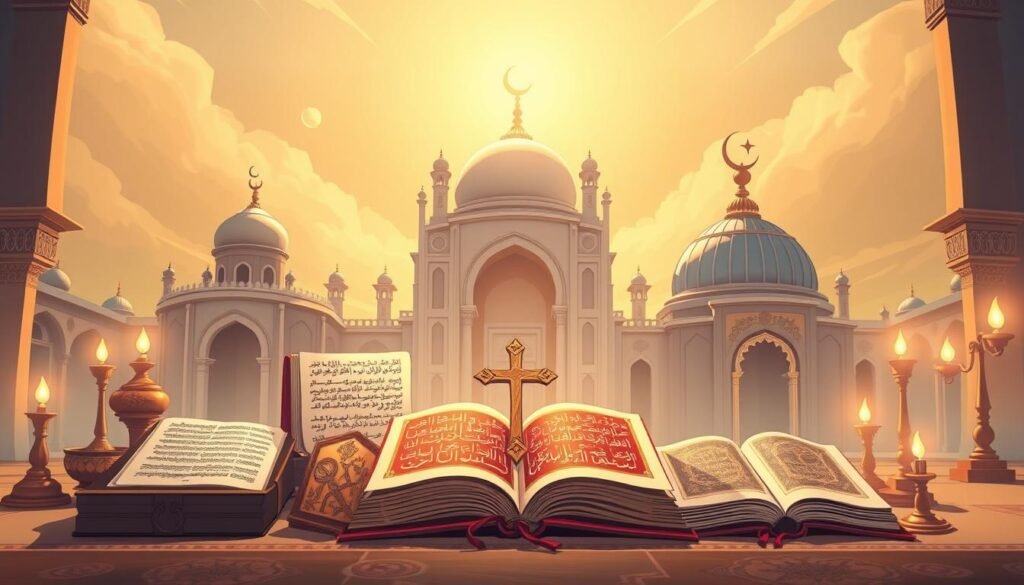I’ve stood at crossroads of faith before. Wondering if it’s possible to follow both religions in a world that often sees faith as a choice between two. Over 2.3 billion Christians and 1.9 billion Muslims share a common root in Abraham’s legacy. Yet, their views on who God is differ sharply.
Can you be Christian and Muslim? This question haunts many, including interfaith families, seekers, and scholars.
Both faiths see Jesus as a prophet, but one calls him Son, the other a messenger. The Quran says the Trinity is shirk (polytheism). Yet, the Catholic Catechism says Muslims worship the same merciful God.
The Quran’s verses, like “My mercy embraces all things” (7:156), show God’s mercy. But there are also warnings of divine judgment. How do these differences affect the idea of following both?
From Malaysia’s Allah controversy to Pope Francis’ words on shared divinity, history shows both tension and kinship. As the Muslim American population grows, so does curiosity about faith’s boundaries. This article doesn’t give a simple yes or no. It asks: What does it mean to honor both traditions without losing core beliefs?
Understanding the Theological Question: Can You Be Christian and Muslim?
Looking into dual faith identity between Christianity and Islam starts with Abraham. He is the common ancestor of all three Abrahamic religions comparison. His legacy is key to this question.
The debate centers on Tawhid in Islam, which says God is one and has no son. This belief is different from Christianity’s Trinity. Both faiths believe in prophets like Jesus, but see his role differently. Muslims see him as a prophet, while Christians believe he is divine.
This difference makes us wonder: Is being religious just about what we believe? Or is it also about how we act? Can doing things like praying or helping others be the same in both faiths?
Talking to scholars shows how these differences are important. The Qur’an says Jesus is not divine (4:171), but the Bible’s Colossians 2:9 says he is. These verses show big differences. Yet, both faiths respect prophets like Abraham and Moses.
Miroslav Volf said, “The question isn’t just about deities—we must examine how communities interpret revelation.”
“Allah is not to be grasped by human comprehension,” wrote Isma’il al-Faruqi, contrasting with Christianity’s emphasis on a relational God. This duality shapes how adherents experience faith.
To understand dual faith identity, we need to know the limits of each faith. Both seek justice and kindness, but they differ at the core. Yet, by exploring these differences with respect, we can learn from each other.
The Core Beliefs of Christianity at a Glance
Christianity believes in one God in three Persons: Father, Son, and Holy Spirit. This is called the Trinitarian belief. It’s different from Islam, which believes in only one God, Allah.
The Christian view of Islam points out this big difference. Islamic teachings say Jesus is not, but just a prophet.
Christians believe Jesus is both God and human. His death and coming back to life are seen as saving humanity from sin. Scholar L. T. Johnson says Jesus’ death is clear proof of this.
In contrast, the Qur’an says Jesus did not die on the cross. This is a big difference between the two faiths.
Christians believe the Bible is inspired by God. But Islam thinks it has been changed over time. The Catholic Church’s sacraments, like Communion, show Christ’s real presence. This is different from Islam’s Five Pillars.
These beliefs show how Christianity and Islam see God and how to be saved. They highlight the Christianity and Islam differences.
“The crucifixion is one indisputable fact,” asserts Paula Frederickson, highlighting its importance to Christian faith.
These key beliefs—Trinity, Incarnation, and resurrection—make Christianity unique. But they also lead to thinking about how they relate to other faiths. This can start conversations about common values like love and justice.
Fundamental Teachings of Islam Explained
Islam is all about following Allah’s will. It uses the Quran and teachings from the Prophet Muhammad. The Five Pillars are key to Islamic practice. They help believers grow spiritually and ethically.
These pillars include saying the shahada, praying five times a day, giving to charity, fasting in Ramadan, and going on the hajj. Each pillar shows that worship is not just personal. It also involves community and helping others.
The Five Pillars of Islam
The shahada is saying you believe in Allah and Muhammad. Muslims pray five times a day, facing Mecca. This helps them connect with Allah.
Charity (zakat) helps the poor. Fasting (sawm) teaches self-control and kindness. The hajj brings millions together, showing unity under Allah.
Islam sees a connection with Christianity through prophets like Jesus. But, it doesn’t see Jesus as divine. This view shapes how Muslims talk to people of other faiths. They look for common ground while keeping their beliefs strong.
Points of Convergence Between the Two Faiths
Looking into Christianity and Islam similarities shows deep connections. Both faiths believe in one God and trace back to Abraham. The Quran sees Jesus as a prophet and agrees with his virgin birth and miracles.

Abraham, Moses, and Jesus are key figures in both faiths. The Quran talks about 25 prophets from the Bible. It shows they all brought messages of truth and one God.
“There is no compulsion in religion”—Quran 2:256
Today, groups like the WCC’s “A Common Word” letter work together. They focus on values like kindness, charity, and peace. By looking at these Christianity and Islam similarities, we can build respect and peace between religions.
Theological Barriers to Dual Religious Practice
The question can you be christian and muslim is complex. It’s tied to theological conflicts at the heart of each faith. For example, Christianity’s belief in the Trinity is not accepted by Muslims. They believe in the Quran’s teaching of God’s oneness.
Christians believe Jesus is divine. But Muslims see him as a prophet, not God. This is shown in Surah 4:171:
“The Messiah, Jesus son of Mary, was only a messenger of Allah”
. These beliefs are not just small points. They are key to each faith’s identity.
Ziauddin Sardar talks about three main issues: theology, experience, and academics. Theology is where Christianity’s Trinitarianism meets Islam’s belief in one God. Experiences like the Crusades and Western missions have caused mistrust. Academic views, like Orientalism, have also played a part.
Practical problems add to these issues. The Nicene Creed says Jesus is “God from God.” But the Quran teaches differently. This makes it hard for both faiths to agree on Jesus’ role.
Sardar says these gaps are big, even as the world changes. By 2050, there will be almost as many Muslims as Christians. This makes learning about each other’s faiths very important.
Frederick Chukwuma Obodoagha’s research shows Nigerian efforts to come together. But finding common ground is hard. It needs honest talks about deep beliefs, not just cultural sharing.
What Religious Scholars Say About Interfaith Identity
Scholars from different faiths discuss interfaith relationships carefully. Christian theologians have debates about God’s nature. Some see it as compatible, while others think it’s impossible.
Anglican bishop Kenneth Cragg said, “The answer to the vexed question, ‘Is the God of Islam and the Gospel the same?’ can only rightly be ‘Yes!’ and ‘No!’” This shows the deep disagreements. Catholic teachings say we all worship one God, but Christ is special.
Protestant thinkers like Paul Knitter suggest that religions are different paths to the divine. This idea is called pluralism.
“We believe in the same God, the one God, the living God.”
— Pope John Paul II in Morocco, 1985.
Islamic scholars usually say Islam is the only true faith. But some, like Omid Safi, want a more open view. Pew data shows 39% of U.S. Muslim marriages are with people from other faiths.
Scholars agree that interfaith relationships need open talks, not just rules. Research
Young people today face special challenges, with 48% of American Muslim youth unsure about their faith. But, studies like Families and Faith show 60% keep their faith strong through open talks. Scholars are moving towards respecting each other’s views more.
As our world becomes more diverse, finding a balance is more important than ever. This balance helps us live in harmony.
The Concept of Religious Syncretism in Modern Times
Religious syncretism is when different faiths mix together. It shows how our world is connected today. People from all over are on a spiritual journey because of moving, technology, and global talks.
In Nigeria, Chrislam mixes Islamic and Christian ways. In the U.S., places like Heartsong in Tennessee welcome Muslim prayers during Ramadan. These spots connect different faiths.
But, syncretism also causes arguments. The American Council of Christian Churches worries it might change beliefs too much. Scholars see people in the West mixing faiths, like adding Buddhist meditation to Christianity.
This trend, called “believing without belonging,” challenges old ideas. It’s seen in insider movements where Muslims explore Christianity without giving up their culture.
“Secularists, the media, and extremists are common enemies,” said Rick Warren, highlighting shared struggles between faiths. Yet blending beliefs risks diluting core teachings. The Barcelona Parliament of World Religions claimed all paths lead to truth—a view many find simplistic.
My study shows both sides: syncretism brings people together but might lose their unique identities. For example, changing Bible translations in Arabic was criticized for softening teachings. As faith groups grow, the big question is: Can they change without losing what’s important? The answer is in talking openly, respecting each other’s paths while supporting personal spiritual searches.
Real-Life Stories: Those Who Navigate Between Faiths
I’ve seen people with dual faith identity in many places. At a 2023 interfaith seminar at Notre Dame, a student said Muslims could fight against secularism. Ayesha, a British-Pakistani woman, fasts during Ramadan but finds comfort in Christ’s teachings. These stories show how spiritual journeys can mix different beliefs, blending tradition with personal beliefs.
Cultural Muslims in Christian Communities
Ayesha was raised in a Muslim family but also prays the Lord’s Prayer. Her story is like Ibrahim’s, a Syrian-American Christian who adds Sufi meditation to his prayer. Even families in London, who celebrate both Christmas and Eid, show how traditions can unite people.
Their paths are not always easy. In some places, mixing faiths can lead to being shunned. But Ayesha’s story shows that faith is about doing good, not just believing. The Salvation Army’s work for 150 years shows that kindness can overcome differences. These stories teach us that spirituality is a journey, not a fixed point.
FAQ
Is it theologically permissible to identify as both a Christian and a Muslim?
Can someone practice the Five Pillars of Islam while following Christian beliefs?
What are some common ethical values shared between Christianity and Islam?
How do Christian denominations differ in their views on interfaith identity?
What is religious syncretism, and how is it perceived in both faiths?
Are there historical precedents for Christian-Muslim syncretism?
How do individuals navigate their Christian and Muslim identities in real life?
How do theological differences impact interfaith families?

Embracing Faith, One Insight at a Time!
The teachings of the Quran have always guided my path. With a deep passion for Islamic knowledge, I strive to blend the wisdom of tradition with the relevance of today, making the timeless messages of Islam accessible and meaningful for everyone.
Muslim Culture Hub is my platform to share historical insights and thought-provoking articles, exploring both well-known and lesser-discussed aspects of Islamic culture and beliefs. My mission is to create an inclusive online space where everyone can learn, strengthen their faith, and connect with the profound message of Islam.
Join the journey!
May peace be upon you.








